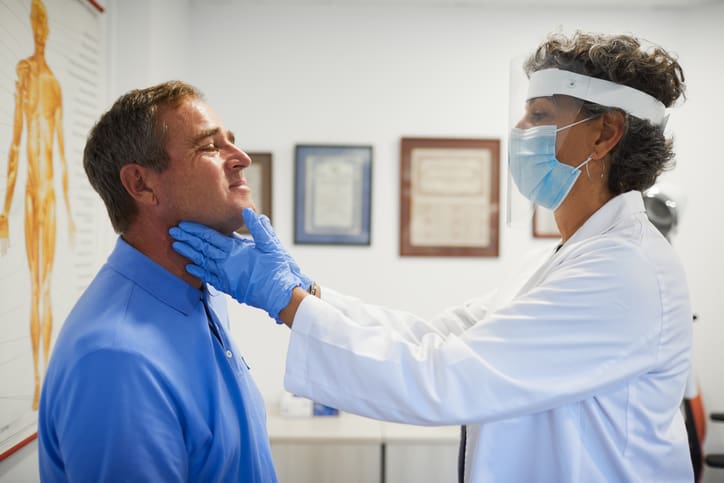It takes a multidisciplinary team of healthcare professionals to identify threats to thyroid health and help patients maintain a healthy thyroid.
According to the American Thyroid Association (ATA), more than 12% of the U.S. population will develop a thyroid condition at some point in their lifetime. The ATA also estimates that at least 20 million Americans have some form of thyroid disease. More than half, however — up to 60%, according to the ATA — are unaware of their condition.
Most thyroid diseases are lifelong conditions. While thyroid cancers typically respond to treatment, a failure to recognize and treat thyroid cancers can have serious consequences.
For example, it puts patients at greater risk for cardiovascular disease, osteoporosis and infertility, for example. Pregnant women with hypothyroidism that goes undiagnosed or undertreated are at greater risk of miscarriage, pre-term delivery, and severe developmental problems in their children, according to the ATA.
Behaviors and lifestyle choices can promote a healthier thyroid. Healthcare professionals can help educate patients on steps they can take to manage risk and maintain optimal thyroid health.
Identifying risk factors
Anyone can suffer from thyroid disease. Hypothyroidism can be present at birth or can develop as a patient ages, such as after menopause for a female patient. In fact, female patients are roughly five to eight times more likely to be diagnosed with a thyroid condition than male patients, according to the Cleveland Clinic.
There are other risk factors. Family history of thyroid disease, medical conditions including pernicious anemia, type 1 diabetes, primary adrenal insufficiency, lupus, or rheumatoid arthritis are all contributing factors.
Diabetic patients are also at a high risk of developing a thyroid disease, according to the Cleveland Clinic. They note that patients that already have one autoimmune disorder are more likely to develop another one.
“For people with type 2 diabetes, the risk is lower, but still there,” the Cleveland Clinic says. “If you have type 2 diabetes, you’re more likely to develop a thyroid disease later in life.”
Type 1 diabetics may be tested more often for thyroid issues—immediately after diagnosis and then roughly every 12 months—but regular testing to check for thyroid issues is recommended for other patients as well.
Testing becomes especially crucial for those at greater risk of thyroid conditions such as hypothyroidism, as the symptoms might not be particularly noticeable at first, the Mayo Clinic points out.
Some patients might attribute symptoms such as fatigue and weight gain to “getting older,” according to the Mayo Clinic, “but as your metabolism continues to slow, you may develop more obvious problems,” such as increased sensitivity to cold, constipation, dry skin, puffy face, hoarseness, muscle weakness, depression and impaired memory.
Developing healthy habits
Healthy habits help minimize patients’ risk for thyroid conditions. Healthcare professionals should encourage patients to engage in these behaviors, including healthy eating habits and regular exercise.
Iodine intake is also important. Recommended daily allowances for iodine intake are 150 mcg for adults, 220-250 mcg for pregnant women and 250-290 mcg for breastfeeding women, according to the National Institutes of Health, which note that iodized salt, dairy products, breads, and seafood are common sources of iodine.
Lean proteins and beans are also healthy choices, along with antioxidant-rich fruits and vegetables such as blueberries, bell peppers, and tomatoes, high-fiber foods in moderation, and heart-healthy fats and omega-3s.
Related: An Overview of Dietary Supplements for Nurses
Vitamins and minerals
Vitamins are critical to thyroid health as well. Foods containing vitamin D — fatty fish, milk, dairy products, eggs, mushrooms, for instance — are also recommended, as insufficient levels of vitamin D have also been linked to Hashimoto’s disease, an autoimmune condition that leads to hypothyroidism.
Researchers have found that low levels of vitamin D can harm patients with hyperthyroidism. Vitamin B12, found in foods such as mollusks, sardines, salmon, dairy products and fortified cereals, also helps alleviate thyroid symptoms.
Victor J. Bernet, MD, chair of the division of endocrinology at Mayo Clinic Florida and president of the American Thyroid Association, also suggests maintaining normal levels of selenium, a mineral known to help regulate the metabolism of thyroid hormones and prevent thyroid disease. Foods that contain selenium include Brazil nuts, sunflower seeds, tuna, crab and lobster.
“[Maintain] a well-rounded diet with adequate selenium intake,” says Bernet, who is also an associate professor at the Mayo Clinic College of Medicine. “Although selenium deficiency is not common in the U.S.”
Despite some recommendations, “it is OK to eat reasonable amounts of cruciferous vegetables — cauliflower, broccoli — as part of a well-balanced diet,” continues Bernet, who also urges avoiding over-the-counter supplements that are marketed to support thyroid function and steering clear of endocrine disruptors such as bisphenols.
“These agents may well impact thyroid hormone function and thyroid hormone levels.”
The care team is critical
A multidisciplinary team is critical for many conditions in endocrinology, says Angela M. Leung, MD, MSc, an associate professor of medicine in the division of endocrinology, diabetes and metabolism, department of medicine at UCLA David Geffen School of Medicine.
“[A patient’s] primary care provider — family practice, internal medicine, pediatrician, OB-GYN — will be the most important healthcare professional in regard to monitoring thyroid health and recommending when thyroid function testing is indicated,” says Bernet, adding that some cases might call for a surgeon who specializes in thyroid disorders.
“If thyroid surgery is necessary, it is important to identify a thyroid surgeon who performs thyroid surgery frequently,” he says.
Hypothyroidism and hyperthyroidism
The benefits of having a care team spanning multiple areas of expertise depends on the type of thyroid condition, says Leung.
For hypothyroidism, for example, levothyroxine as thyroid hormone replacement is the most commonly prescribed medication in the United States, she says.
“For this reason, many primary care providers play the main role in managing patients with hypothyroidism; if healthcare professionals consult endocrinologists for unusual cases, it is important to maintain close communication with the primary care team.”
When working with patients with hyperthyroidism, endocrinologists often advise various treatment options, continues Leung.
“If, however, definitive therapy like thyroid surgery or radioactive iodine are necessary, establishing and maintaining excellent communication between the respective clinicians managing those treatments — the nuclear medicine and surgery teams — together with the endocrinologist and primary care provider, is optimal.
“Finally, for patients with thyroid nodules and thyroid cancer, members of an optimal multidisciplinary team, composed of both physicians and advanced practice providers, may include the primary care provider, endocrinologist, radiologist, thyroid surgeon, nuclear medicine physician,” she concludes, “and for more advanced thyroid cancer cases, a medical oncologist with expertise in this area.”
References
- The American Thyroid Association, 2020. Accessed Dec. 15, 2020. https://www.thyroid.org/media-main/press-room/
- The Cleveland Clinic, 2020. Accessed Dec. 16, 2020. https://my.clevelandclinic.org/health/diseases/8541-thyroid-disease
- The Mayo Clinic, 2020. Accessed Dec. 17, 2020. https://www.mayoclinic.org/diseases-conditions/hypothyroidism/symptoms-causes/syc-20350284
- Premier Health, 2020. Accessed Dec. 17, 2020. https://www.premierhealth.com/your-health/articles/women-wisdom-wellness-/thyroid-health-tips-for-eating-right
- National Institutes of Health, 2020. Accessed Dec. 18, 2020. https://ods.od.nih.gov/factsheets/Iodine-HealthProfessional/
- GoodRx, 2017. Accessed Dec. 17, 2020. https://www.goodrx.com/blog/why-synthroid-is-the-most-prescribed-drug-in-the-us/#:~:text=Why%20is%20Synthroid%20(levothyroxine)%2C,of%20prescriptions%20written%20by%20physicians%3F






